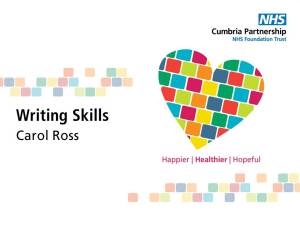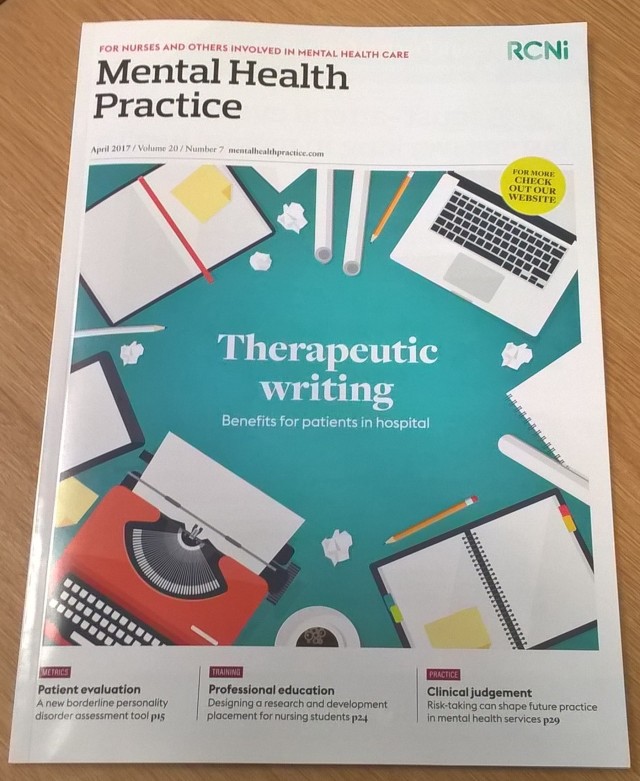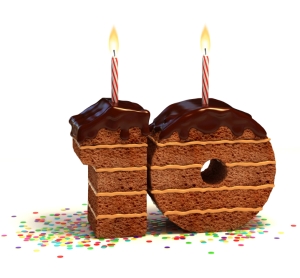Writing Skills Workshop
This long post is primarily intended as background reading for staff of Cumbria Partnership NHS Foundation Trust (CPFT) attending a writing skills workshop on 8th May 2017. However, almost all of the content in the post should be both accessible to, and relevant to, people from outside CPFT and outside of the UK.
The workshop timings are 13:00-16:00 and the main topics in the programme are:
• Writing for wellbeing and stress management
• Reflective writing
• Elements of effective written communication
Click here if you would like to read the programme. Click here for the Powerpoint presentation, which covers the section on elements of effective written communication. Click here if you would like to see the evaluation form.
Writing for Wellbeing
Writing can help both mental and physical wellbeing. It can clarify thoughts and feelings, improve mood and positivity, bring more focus to the mind, change your perspective on things, and through all these help you manage stress. In my work as a Writing Practitioner I have found that different kinds of writing are helpful for different symptoms and problems.
When I recommend or use a particular type of writing with someone I am hoping for a specific effect, which may be short term or long term. When someone is feeling highly stressed or mentally unwell, short-term effects are needed, e.g., calming,
relaxation, bringing the attention into the present moment, increasing mental focus or respite (from voice hearing for example). Mindful writing is very useful in these circumstances. Once an individual is feeling calmer and more focussed, a writing technique such as perspective shift or positive writing can be useful to bring a new perspective on problems and even change the way we think.
My main aim in writing sessions is to inspire and encourage participants to write to help with their recovery and wellbeing. I want to inspire people to continue writing regularly after the end of the workshop(s) they attend. With this in mind, I aim to make the sessions as enjoyable and varied as I can. I use flexible writing exercises so that I can adapt them to individual needs and capability. I believe that different kinds of writing can be therapeutic for different symptoms and problems.
In developing and selecting therapeutic writing exercises I have been influenced by (i) observations of mental health patients in ward groups, i.e., what type of writing works for what symptoms; (ii) research studies on therapeutic writing; and (iii) consideration of how certain well-established therapies can be applied to therapeutic writing, in particular: Mindfulness Based Cognitive Therapy and Narrative Therapy.
Writing for Stress Management
For stress management I recommend keeping a journal in which you write: 5 minutes each per day of mindful descriptive and mindful expressive writing; plus longer, less frequent, writes using other techniques such as positive and perspective shift writing.
Therapeutic writing is a powerful box of tools that can help us cope with short-term acute stress and manage long-term stress. At times of acute stress, a short piece of mindful writing can bring calm and focus, and a daily practice of mindful writing (expressive and descriptive) is helpful in long-term stress management. Other writing techniques such as perspective shift and positive writing can help us change our thinking patterns to tackle the root causes of excessive stress.
Writing for Wellbeing and Reflective Writing Techniques
Journaling
There are many techniques and many books with ideas for writing journals. Here I describe a technique called Captured Moment developed by Kathleen Adams and described in her book Journal to the Self: Twenty Two Paths to Personal Growth (Adams, 1990). The idea is to write about a moment of your life, for example: a moment of joy, sadness, delight, anguish, exhilaration or serenity, and really bring it to life by including as much detail as you can remember about what you could see, smell, hear, taste and feel at the time. Write for 15 minutes about one of the happiest moments you can remember. Include as much detail as you can about what you could see, hear, taste, smell and feel in that moment.
Mindful writing: descriptive
I think of mindful descriptive writing as a writing meditation: choose an object, or a photograph of a beautiful place, and write to describe it in some detail. Don’t add thoughts, associations, feelings. Just write a description of the picture or object. Or, better still, notice something in the real world, perhaps the view around you or out of the window, and write to describe it. If possible include description of more than just what you see, e.g., the sound a bird is making, the smell of the flowers. I recommend this as a daily practice along with writing a journal. Example exercise (mindful writing about something in the real world): (1) Write for about 5-10 minutes to describe an object in detail – how it looks, smells and feels (this is the mindful writing bit). (2) Optional second part: write for another 5 minutes about any thoughts, memories or associations that spring to mind. This second part of the exercise is not mindful writing – so let the writing take you where it will, and write from your imagination if you wish. [10-15 minutes]. Desired effects: calming; lowering/raising psychological arousal; increasing mental focus; increasing sense of the present; teaching mindfulness; increasing appreciation of the world; decreasing focus on self/problems.
Mindful writing: expressive
This technique involves writing to describe how you feel right now. Do not add thoughts or associations. Write non-judgementally. Write only about how you feel in this present moment. Sometimes I combine mindful expressive writing with metaphor, for example: “What kind of weather am I right now?” Example workshop exercise (body scan write): (1) Take 5 minutes to write about how you feel physically. Starting at your toes and moving up, write about how each part of you feels – hot or cold? Comfortable or uncomfortable? Tense or relaxed? Tingly? Painful? (2) Now write for 5 more minutes about how you feel emotionally and mentally right now. Desired effects: increasing mental focus; increasing sense of the present; teaching mindfulness; possibility for improving clarity of thoughts/problems.
Positive writing
For example you could write a journal each day but only write about positive things. Example workshop exercise: someone who has lost a parent who they loved and got along well with could write about a positive memory of being with them. Desired effects: motivation; encouragement; perspective; decreased negativity.
Reflective and perspective shift writing
Example workshop exercise: think about a conversation you had recently. Now imagine that you are the other person in the conversation, or perhaps an object that was there at the time – a coffee cup maybe – and write about the event or conversation again from this new point of view, in the third person. Desired effects: insight; shift of focus from self to other(s).
Fictional characters
Example workshop exercise: choose a photograph from a selection of photographs of people, preferably doing something, e.g., sitting outside a café, sleeping, reading, making something. Think about who they are, their name, what they do, who they live with and where. Write about them doing an activity. Desired effects: decreasing focus on self/problems and increasing focus on the real world and the people in it.
Freewriting
Freewriting means writing for a timed period without stopping to think, punctuate or correct your writing in any way. The idea is to just keep writing whatever comes into your head, without stopping. Example workshop exercise: in response to stimulus words (4 words, 2-3 minutes per word), write for without stopping to think, punctuate or correct your writing in any way. The idea is to just keep writing whatever comes into your head, without stopping. Desired effects: calming; lowering/raising psychological arousal; freeing up of writing/thoughts; possibility of insights.
Writing inspired by metaphors/symbols
Example workshop exercise: look at cards with symbols on, e.g., circle, triangle, square, rectangle, and write what each symbol means for you or your life at the moment. Desired effects: freeing up of writing/creativity; possibility of insights.
Handouts
Therapeutic Writing
Mindful Writing
Journals and Diaries
Freewriting
Fictional Characters
Reflective Writing
Random Input
Therapeutic Writing Research / Further Reading
Research shows that writing can have positive effects on health and wellbeing, but no-one knows how and why it works (King, 2002, p. 119). What is clear is that the beneficial effects of writing arise from the process of writing one’s thoughts. The writing that is produced – the product – is less important.
In most of the research into the benefits of creative writing, the research subjects were directed to write about negative events; the most well-known researcher undertaking studies of this nature being Pennebaker (1997). However, I rarely use a negative approach because I believe, as Laura King argues in her article ‘Gain without pain’ (2002:131), that it is not necessary to write about negative emotions or events to gain benefit from writing. People can benefit from writing that inspires happiness or joy. There is certainly a place for writing about undisclosed trauma, but repeatedly writing about negative thoughts can be counter-productive by reinforcing negative thinking.
The writing I find one of the most helpful is mindful writing, and I recommend daily mindful writing practice. The benefits of mindfulness are too well evidenced to need much mention here. Mindfulness is increasingly being incorporated into treatments for mental health for example (see Williams, Teasdale, Segal and Kabat-Zinn, 2007)
References
Adams, K. (1990) Journal to the Self: Twenty Two Paths to Personal Growth, USA: Grand Central Publishing.
King, L. (2002). Gain without pain? Expressive writing and self-regulation. In S.J. Lepore, J.M.; Smyth (eds.) (2002) The writing cure: How expressive writing promotes health and well-being. Washington DC: American Psychological Association.
Pennebaker, J.W. (1997). Writing about emotional experiences as a therapeutic process. Psychological Science, 8, 162-166.
Williams, M.; Teasdale, J.; Segal, Z.; Kabat-Zinn, J. (2007). The mindful way through depression: Freeing yourself from chronic unhappiness. New York: The Guilford Press
Further Reading
Reflective Practice: Writing and Professional Development, by Gillie Bolton, published by Sage Publications, 2005.
Expressive Writing: Words That Heal, by J. W. Pennebaker & J. F. Evans, published by Idyll Arbor, 2014.
Words for Wellbeing: Using Creative Writing to Benefit Health and Wellbeing, edited and co-authored by Carol Ross, published by Cumbria Partnership NHS Foundation Trust, 2012.
Therapeutic Journal Writing: An Introduction for Professionals (Writing for Therapy or Personal Development), by Kate Thompson, published by Jessica Kingsley, 2010.




